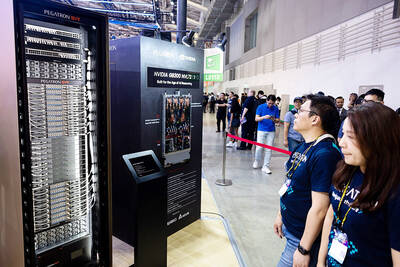Despite a strengthening local currency, Taiwanese exports rose to US$24.19 billion last month, up 8 percent from a month earlier, with shipments of electronics products hitting an all-time high of US$7.25 billion, the Ministry of Finance said yesterday.
“The foreign exchange rate only fluctuated sharply recently. The New Taiwan dollar averaged between NT$31 and NT$32 against the US dollar over the past few months,” Lin Lee-jen (林麗貞), head of the ministry’s statistics department, told a media briefing.
“It is really hard to tell whether the appreciation of the NT dollar impacted exports. Our trade rivals also saw currency gains. We need to observe it for a longer time,” Lin said.
On a yearly basis, exports posted better-than-expected growth of 21.9 percent, higher than the 17.5 percent gain in September, thanks to a pickup in sales to the US and Europe and a rebound in shipments of electronic products.
“The stronger readings in exports for last month should be taken as a positive sign that local exporters may have started to make delivery of orders ahead of the year-end festive season,” Standard Chartered chief economist Tony Phoo (符銘財) said yesterday in an e-mailed statement.
Exports to Europe were US$2.68 billion last month, posting the highest level since the global financial crisis. That represented an increase of 17.5 percent from a year earlier, the ministry said.
“Overseas buyers may not be as concerned as initially feared in terms of performance of year-end sales,” Phoo said.
In the first 10 months, exports reached a record high of US$226.4 billion, up 38.4 percent from a year earlier, with exports to China (including Hong Kong), six ASEAN nations and Japan all hitting the highest amount in history.
“This indicates that exports for the full year will likely post a record high,” Lin said.
However, she warned that a slower global recovery, combined with European austerity measures and potential foreign exchange rate fluctuations, could result in declines in fourth-quarter data.
Meanwhile, imports last month rose 2.8 percent to US$21.21 billion from US$20.63 billion in September as a result of growing purchases of consumer goods, which rose 16.4 percent sequentially.
On an annual basis, imports increased 27.9 percent, higher than 25 percent growth in September.
From January to last month, imports totaled US$33.5 billion, up 67.6 percent from a year earlier, due chiefly to substantial growth in the import of machinery, which rose US$10.12 billion or 90.2 percent year-on-year, the ministry’s data showed.
“All these figures reflect a rebounding confidence among local producers, firms and businesses, amidst an ongoing revival in domestic spending,” Phoo said.
Phoo said that last month’s data, coupled with the latest reading on inflation, suggested the possibility of another 12.5 basis points hike in interest rates by the central bank at its quarterly meeting next month.

AI TALENT: No financial details were released about the deal, in which top Groq executives, including its CEO, would join Nvidia to help advance the technology Nvidia Corp has agreed to a licensing deal with artificial intelligence (AI) start-up Groq, furthering its investments in companies connected to the AI boom and gaining the right to add a new type of technology to its products. The world’s largest publicly traded company has paid for the right to use Groq’s technology and is to integrate its chip design into future products. Some of the start-up’s executives are leaving to join Nvidia to help with that effort, the companies said. Groq would continue as an independent company with a new chief executive, it said on Wednesday in a post on its Web

RESPONSE: The Japanese Ministry of Finance might have to intervene in the currency markets should the yen keep weakening toward the 160 level against the US dollar Japan’s chief currency official yesterday sent a warning on recent foreign exchange moves, after the yen weakened against the US dollar following Friday last week’s Bank of Japan (BOJ) decision. “We’re seeing one-directional, sudden moves especially after last week’s monetary policy meeting, so I’m deeply concerned,” Japanese Vice Finance Minister for International Affairs Atsushi Mimura told reporters. “We’d like to take appropriate responses against excessive moves.” The central bank on Friday raised its benchmark interest rate to the highest in 30 years, but Bank of Japan Governor Kazuo Ueda chose to keep his options open rather than bolster the yen,

Even as the US is embarked on a bitter rivalry with China over the deployment of artificial intelligence (AI), Chinese technology is quietly making inroads into the US market. Despite considerable geopolitical tensions, Chinese open-source AI models are winning over a growing number of programmers and companies in the US. These are different from the closed generative AI models that have become household names — ChatGPT-maker OpenAI or Google’s Gemini — whose inner workings are fiercely protected. In contrast, “open” models offered by many Chinese rivals, from Alibaba (阿里巴巴) to DeepSeek (深度求索), allow programmers to customize parts of the software to suit their

Global server shipments are expected to surge to 15 million units next year, from 4 million units this year, with artificial intelligence (AI) servers accounting for about 30 percent, driven by massive capital spending by major cloud service providers, the Market Intelligence and Consulting Institute (MIC) said on Thursday last week. Major cloud service providers — including Google’s parent company Alphabet Inc, Microsoft Corp, Amazon.com Inc and Meta Platforms Inc — are projected to budget US$450 million for capital expenditure next year, up from US$400 million this year, MIC ICT [information and communications technology] Industry Research Center director Edward Lin